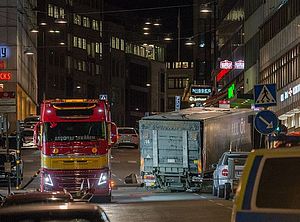For a global public accustomed to ignoring Central Asia, the news that the St. Petersburg bombing and the Stockholm truck attack were allegedly both perpetrated by ethnic Uzbeks begs the question: why are Uzbeks committing such heinous acts?
“Attacks exemplify allure of extremism in ex-Soviet republics,” a recent AP headline read. The article is brief, noting that the two attacks last week follow a handful of other high-profile attacks that have Central Asians as the suspected culprits, including the New Year’s shooting in an Istanbul nightclub and the June 28 attack on the Istanbul airport. Poverty-ridden Central Asia, the article goes on, has been troubled by Islamist insurgencies since the collapse of the Soviet Union.
This is the typical formulation for international media attempting to explain Central Asia — suddenly a region worth remarking on — to the world: former USSR, poor, oppressive, Muslim. None of those four descriptors are objectively false, but neither do they explain very much with regard to why some individuals from the region find extremism alluring. Most people from Central Asia (like most people around the world) don’t become terrorists and the region itself is almost devoid of terror attacks.
Uzbeks are Central Asia’s largest ethnic group, numbering at more than 30 million. There are Uzbeks in every former Soviet state, more than 2 million in Afghanistan, and many thousands that live around the world. There is nothing about Uzbeks, as an ethnic group, or their culture that makes them more susceptible to radicalization. There are, however, structural and circumstantial reasons that have led individual Uzbeks to terrorism. Let’s examine the two recent cases.
The St. Petersburg bomber, according to Russian authorities was a 22-year old, Kyrgyz-born, ethnic Uzbek, Russian citizen. Which of those descriptors is the most important in explaining why he would bomb a metro car in St. Petersburg?
Akbarzhon Jalilov moved to Russia with his parents when he was 16, in 2010. They left Osh, Kyrgyzstan, the site of terrible violence against Uzbeks by Kyrgyz in the aftermath of the spring 2010 revolution. Jalilov remained in Russia when his parents returned to Kyrgyzstan a few years later. As Reuters notes, he lived in St. Petersburg for several years but there’s a gap in his timeline around 2015. Former work colleagues say he may have traveled to Turkey and he was said to have been in Osh as recently as March.
Little is known about why he decided to do what the authorities say he did and carry out a bombing on the St. Petersburg metro. If, as the assumption goes, Jalilov was motivated by extremist ideology, Russia’s policies in Syria — firm support for Bashar al-Assad and attacks on rebel groups — may be a likely factor. Uzbeks have been targeted by ISIS recruiters through Uzbek-language propaganda, despite the fact that more Uzbeks are aligned with rebel groups fighting ISIS. ISIS also routinely publishes propaganda in a number of languages, including Arabic and Russian (and, more recently, Mandarin Chinese).
Now, to the truck attack in the Swedish capital, Stockholm. Swedish authorities have identified the man who drove a truck into a department store — killing four — as a 39-year-old Uzbek national. Swedish media have named the man as Rakhmat Akilov. Akilov reportedly left his family in Uzbekistan to find work in 2012. In 2014 he applied for residency in Sweden but was denied in December 2016, a few months after being fired from his job. He was given four weeks to leave the country but did not, landing on a wanted list in February. People who knew him said he was not particularly religious, but his Facebook did have two ISIS propaganda videos. At the same time, he apparently liked a page dedicated to Playboy.
Akilov has been arrested by Swedish police and reportedly said he was “pleased with what he had done” and that he had “accomplished what he set out to do.”
Notably, none of the attacks mentioned above involving Uzbeks have happened in Central Asia. While it is important to examine the economic and social factors that motivate people to leave Central Asia — poverty, repressive governments, lack of religious freedom — all those involved seem to have been radicalized outside of the Central Asian region, in Russia, in Turkey, or online. Blaming Central Asia for its citizens being radicalized years after they’ve left the region is a cop-out, at best.
Better questions worth asking, in no particular order: If Jalilov went to Turkey and possibly Syria, why did Moscow not flag him upon his return? Why was Akilov denied residency? What was Jalilov’s motivation for the bombing? Were either Jalilov or Akilov instructed or were they “lone wolves”? Where and how were Jalilov and Akilov radicalized, if that is the case? What responsibility do Russia and Sweden have for people who are radicalized within their territory? What responsibility do countries have for their citizens who become terrorists, regardless of where their attacks occur?

































